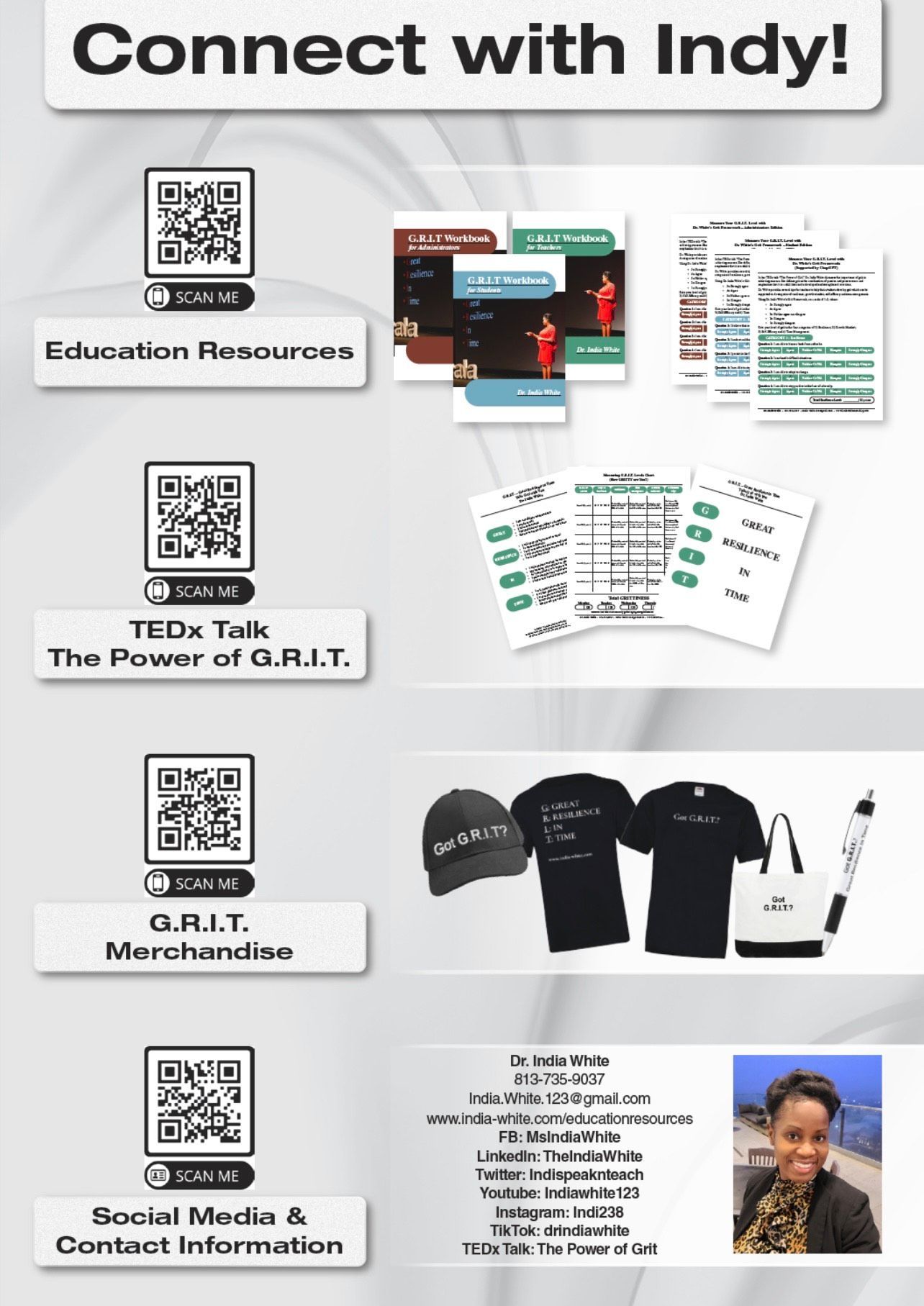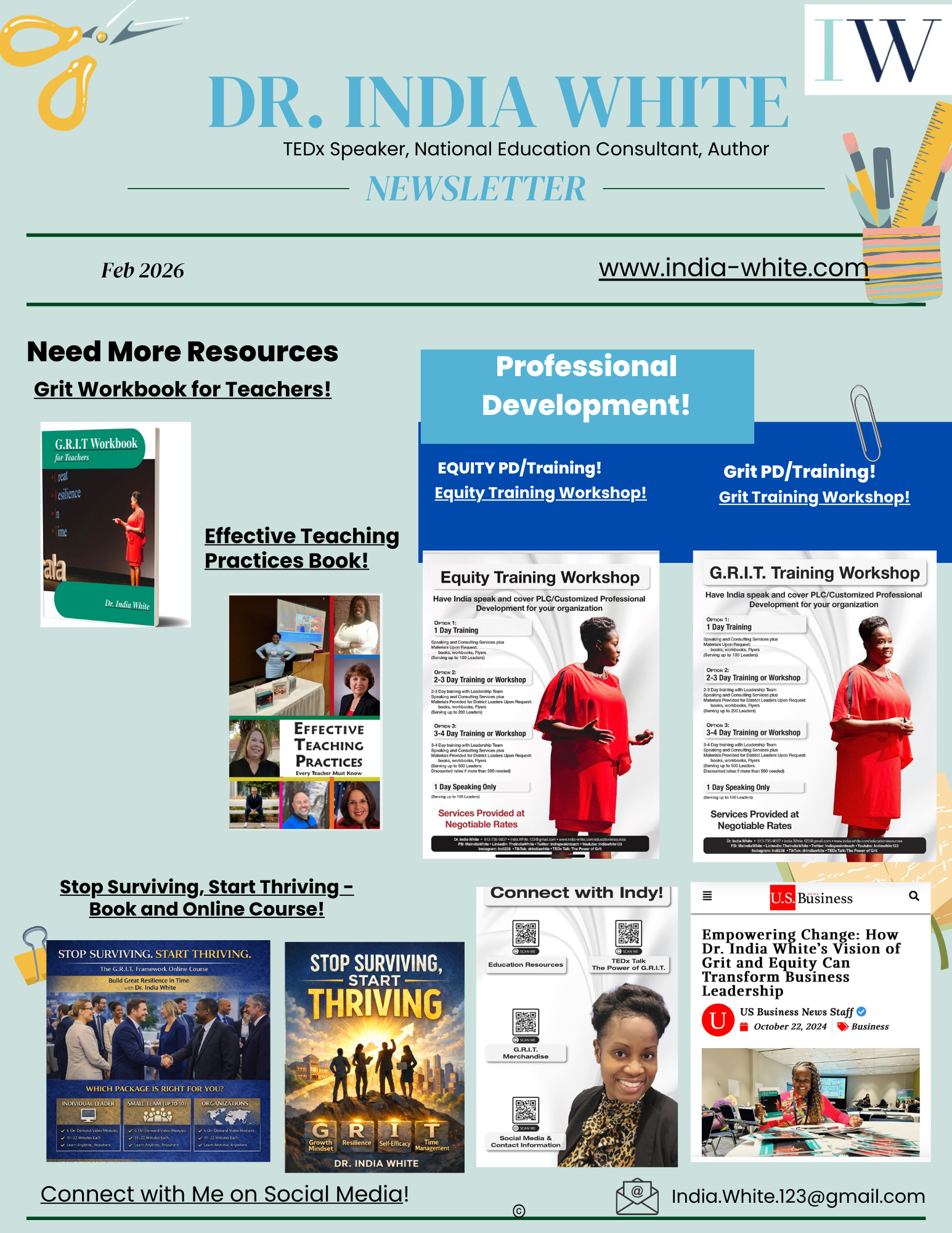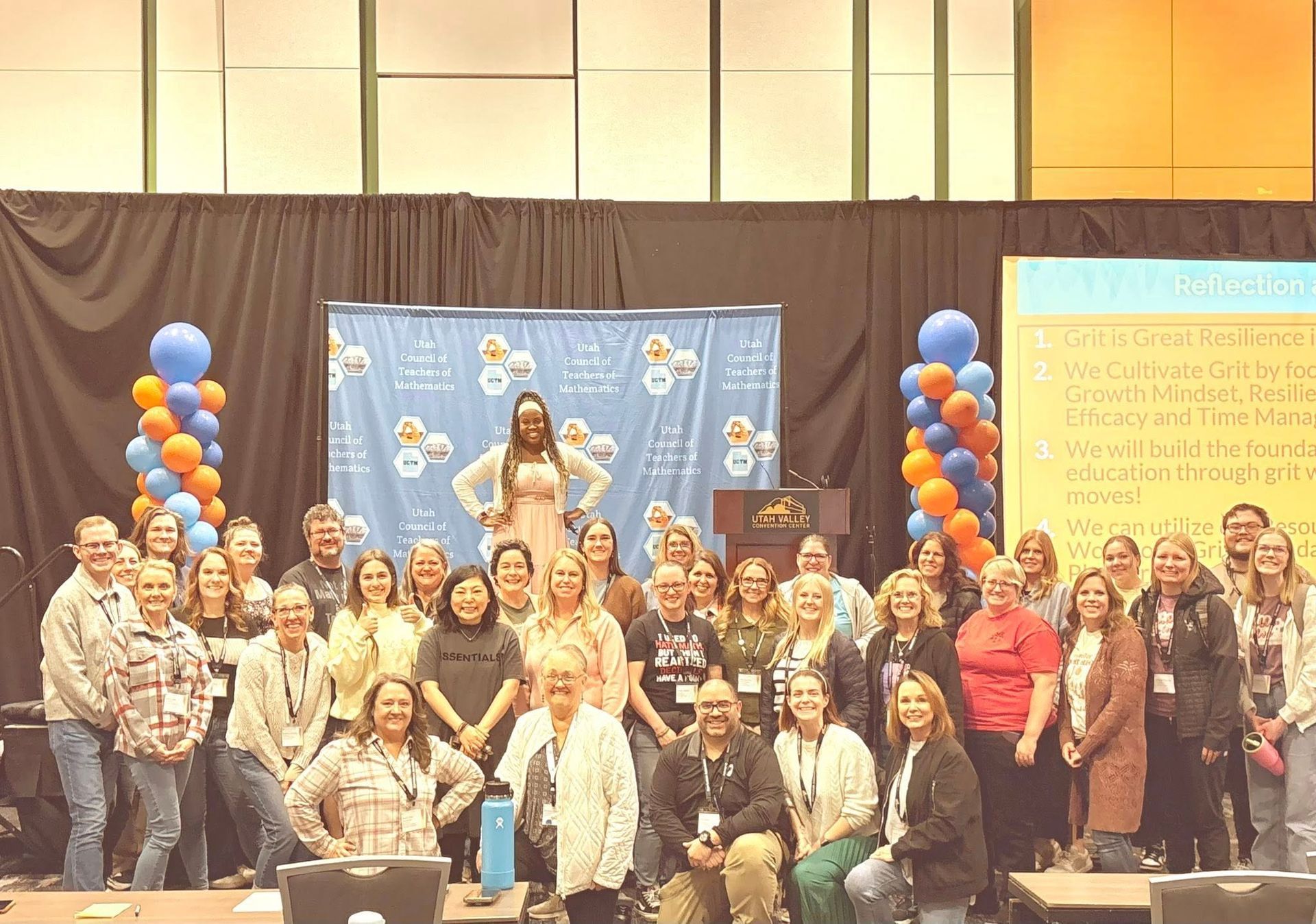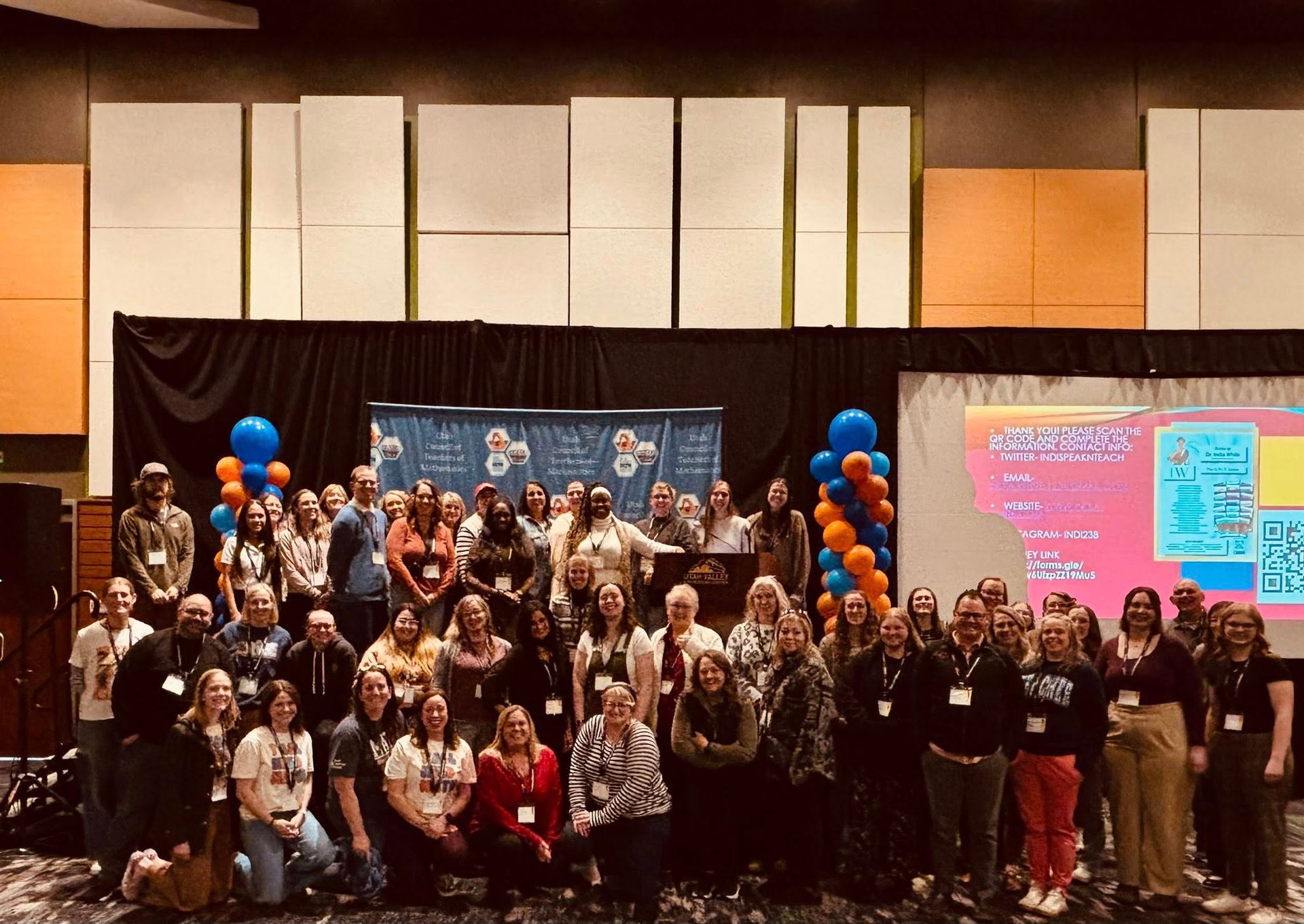Helping Students of Color Overcome Imposter Syndrome through Grit!
India White • June 5, 2023
Helping Students of Color Overcome Imposter Syndrome through Grit

Helping Students of Color Overcome the Imposter Syndrome through Grit
Sometimes, entering a math classroom is like going into a warzone for many students of color. Students struggle with a low sense of self in math class, math anxiety, and a fear of failure. These various factors contribute to an overall sense of imposter syndrome in students of color. Imposter syndrome
is a common feeling among students, especially in math class. It is the feeling of being a fraud, despite having the necessary skills and knowledge. This feeling can be overwhelming and can lead to anxiety, stress, and even depression.
As students embrace these negative hurdles, they can feel powerless, and begin to doubt their abilities to perform as competent mathematicians. However, with the power of grit, students can overcome imposter syndrome and excel in math class. Here are seven tips
to help your students overcome imposter syndrome in math class through grit:
1. Embrace the struggle
According to Angela Duckworth, a leading researcher on grit, embracing struggle is a key component of grit.
When your students encounter a difficult math problem, encourage them to not give up. Instead, teach them how to embrace the struggle and keep working on the problem until they find a solution. This will help them build resilience and develop a growth mindset. Remind them to fight the urge to be average or to coast through, and to do their best to strive at excellence!
2. Set realistic goals
Setting realistic goals is essential to overcoming imposter syndrome. Don't set students up for failure through establishing unrealistic goals. Instead, set achievable goals that will challenge them, but are still within their reach. This will help them build confidence and develop a sense of accomplishment. Follow up with students on a regular basis and provide timely feedback when needed as they progress in the classroom. As you establish goals with these students and track their progress, this will shape their optimistic attitudes towards their ability to persist in the math classroom, causing them to succeed through grit.
3. Have Students Practice Self-Compassion
In her podcast on “Building Grit through Self- Compassion”, Therapist Dr. Kristen Neff defines self-compassion as a fierce accountability that is core to one’s psychological health, seeing it as an anti-dote to “shame”. Dr. Neff outlines 3 steps to truly practice self-compassion:
Hence, self-compassion is an important aspect of grit as students thrive through productive struggle in the math classroom. When students of color make mistakes or struggle with a math problem, remind them to not beat themselves up. Instead, discuss with them how they can practice self-compassion and remind them that everyone makes mistakes and struggles at times. This will help students develop a positive attitude towards their abilities and will cultivate a strong sense of self while enhancing their math identity. Further, it will help students to achieve and not feel like they can’t DO math
because they are of a particular diverse racial or ethnic background, or because they are a first-generation learner with no mentors or leaders of diverse representation in the math space for them to look up to.
4. Seek support
Seeking support from others is an important part of overcoming imposter syndrome. Take time to talk with your math students about various concepts or problems they may struggle with. Present opportunities where they can join a study group or seek support from friends and family. This will make your students feel less alone and more confident in their abilities to conceptualize math
and have a strong math voice during learning.
5. Focus on the process
Teach your learners that focusing on the process rather than the outcome is another key component of grit. Instead of them worrying about getting the right answer, encourage students to focus on the steps they need to take to solve the problem. This will help students develop a deeper understanding of the math concepts and build their ability to perform proficiently as they tackle math problems. As students focus on the process, this will give them the skills needed to remain disciplined and resilient
while achieving proficiency in their learning.
6. Celebrate successes
Celebrating the success of your students, no matter how small, is an important part of developing grit. When students solve a difficult math problem or understand a concept that they previously struggled with, take a moment to celebrate your success. This will help your students build confidence and motivate them to keep working hard. Through celebrating successes, students will know that you believe in them and that you are cheering for them. This will cause them to develop a stronger sense of trust in you as their leader, and will create a desire in them to please you through their performance and comprehension in the math classroom.
7. Embrace failure
Embracing failure is another important aspect of grit. Tell your students, “Don't be afraid to make mistakes or fail at a math problem.” Teach them to choose to use failure as an opportunity to learn
and grow. Failure is a part of achieving success. Remind your students that practice makes perfect and that as they embrace their growth mindset, they will realize that they have similar struggles to their peers, and that everyone is simply doing their best to learn math to their maximum capacity every day.
Conclusion
As students enter the classroom with various fears, anxiety and self-doubt, choose to provide an environment of hope and cultivation of math abilities by helping them overcome the imposter syndrome. Continue to remind your learners that you believe in them. Help them through these seven tips through practicing self-compassion, focusing on the process, celebrating their success, helping them to embrace failure in a positive lens. Through this, you will convince them that are NOT
powerless in the math classroom, and that they can thrive beyond any mental or emotional limitations as they DO math!!
WANT MORE?
Follow up with me to connect for more information or to have me speak at your next school event, conference, or university!
Also, scan the QR codes below if you are in need of resources for your students, teachers or adminsitrators at your school or university!


It Pays to Pay It Forward Through Grit Recently, I had the honor of delivering a keynote for the Junior League of Sarasota—an experience that reminded me why paying it forward is not just a kind gesture, but a powerful investment in people and communities. Years ago, I was navigating homelessness. Today, I stand as Dr. India White. That transformation did not happen in isolation. It happened because a community chose to invest in me—through contributions, encouragement, mentorship, and belief. The return on that investment is not just my success. It is every life I now impact, every student empowered, every leader equipped, and every young person who discovers their grit. That is the power of paying it forward. Grit: The Multiplier of Generosity Research by Angela Duckworth defines grit as passion and perseverance for long-term goals. Her studies show that grit is a stronger predictor of success than talent alone. But grit does not grow in a vacuum. It grows when: * Someone believes in you before you believe in yourself. * A community provides access and opportunity. * A leader models resilience in action. Through my GRIT Framework, I teach four core pillars: 1. Growth Mindset – The belief that abilities can be developed (supported by research from Carol Dweck). 2. Resilience – The capacity to recover and adapt in adversity. 3. Self-Efficacy – Confidence in one’s ability to execute and succeed (rooted in the work of Albert Bandura). 4. Time Management – The discipline to steward time as a strategic asset. When philanthropy invests in these four areas, the return compounds. From Homelessness to Leadership: A Community ROI Story The community that supported me did more than offer charity—they offered belief. And belief activates self-efficacy. Studies in community development show that mentorship, stable support systems, and access to opportunity significantly increase long-term educational attainment and career mobility among underserved youth. When organizations invest early and consistently, outcomes shift across generations. That’s the return on investment the community now sees. Because someone paid it forward: * I earned advanced degrees. * I developed a framework that equips leaders. * I now reinvest in youth, professionals, and organizations. The cycle continues. As Scripture reminds us: > “Give, and it will be given to you.” — Gospel of Luke 6:38 > “Let us not grow weary in doing good.” — Epistle to the Galatians 6:9 Paying it forward is not transactional—it is transformational. Practical Tips for Philanthropists & Community Organization Leaders If you serve underserved youth or invest in your community, here are strategies to maximize your impact: 1. Fund Development, Not Just Programs Invest in mindset training, leadership development, and mentoring—not only events. Skills compound over time. 2. Build Self-Efficacy Early Create environments where youth accomplish measurable wins. Confidence grows through evidence. 3. Model Resilience Publicly Share stories of setbacks and recovery. Normalize struggle as part of growth. 4. Provide Access to Networks Social capital is often the missing link. Introduce youth to rooms they may not otherwise enter. 5. Measure Long-Term Outcomes Track mentorship continuity, leadership progression, and educational milestones—not just attendance numbers. 6. Teach Time Stewardship Time management is life management. Equip young leaders to prioritize strategically. The Ripple Effect of Grit When communities invest in grit: * Dropout rates decrease. * Leadership pipelines diversify. * Economic mobility increases. * Future philanthropists are created. Because those who receive often become the most passionate givers. That is living proof that it pays to pay it forward. Gratitude I am deeply grateful to the Junior League of Sarasota for the opportunity to share this message. Thank you for your leadership and your unwavering commitment to serving the community. I also extend sincere appreciation to Representative Detert’s family for creating such a meaningful and memorable experience. Your hospitality and legacy of service continue to inspire. Let’s Continue the Work If you are a philanthropist, community leader, or organization seeking to strengthen your impact, I would love to connect. Visit india-white.com to: * Book a keynote or leadership training * Learn more about the GRIT Framework * Purchase the GRIT Workbook for Leaders When we invest in grit, we invest in generational change. And I am living proof that when a community believes in one person, the return on that belief can echo for decades. Let’s keep paying it forward.

Gratitude to ABC7 Sarasota for Highlighting the Junior League of Sarasota’s Annual Luncheon I am filled with gratitude after the incredible opportunity to join ABC7 Sarasota / MySuncoast News to share the work and mission of the Junior League of Sarasota. Being featured on such a trusted local platform was both an honor and a meaningful chance to spotlight the impact our members are making in the community. This year’s Annual Junior League of Sarasota Luncheon was especially important, as it allowed us to shine a light on one of our most heartfelt initiatives: the Nancy’s Village project. Having the chance to speak on behalf of the League during the segment gave me the space to share why this project matters so deeply. Nancy’s Village represents our commitment to supporting women and children facing housing insecurity, and bringing awareness to it through ABC7 helps amplify our ability to serve. I am also grateful for the opportunity to speak about the keynote I delivered at the luncheon. It was an empowering moment to reflect on the strength of our membership, the evolution of our mission, and the collective energy that continues to drive us forward. Sharing that message publicly—thanks to ABC7’s support—allowed us to connect with an even wider audience about the value of women’s leadership and community service. Thank you to the entire ABC7 Sarasota team for welcoming me, elevating our work, and helping us continue to make a difference on the Suncoast. Your dedication to telling meaningful stories truly strengthens the community we all share. We are honored to have partnered with you, and we look forward to many more moments of collaboration and celebration ahead. Watch the news clip here: https://www.mysuncoast.com/video/2026/02/24/dr-india-white-speak-junior-league-sarasota-legacy-luncheon-suncoast-view-february-24th-2026/?fbclid=IwY2xjawQNJz5leHRuA2FlbQIxMABicmlkETJBT2pQSW1saWY1bk5uZElmc3J0YwZhcHBfaWQQMjIyMDM5MTc4ODIwMDg5MgABHigh5Aq-p-i5Ru2Jpbj3dLCwmYwC9um1PLRsQF85ONy4gVq0CnzfGI2HZ7Ah_aem_vVr1lF1ts099Uypq-msePA

Full-Circle Moment with the Junior League of Sarasota Yesterday, I had the incredible honor of delivering a keynote for the Junior League of Sarasota—an experience that left me both humbled and energized. The atmosphere in the room was electric, filled with leaders, visionaries, and changemakers committed to uplifting our community. It reminded me, once again, that we are truly better together. A Moment Years in the Making What made this keynote especially meaningful was the presence of two pillars in my life: • My high school teacher, Ms. Wilson, whose encouragement helped shape the woman I am today • The family of Representative Detert, whose legacy of service and leadership continues to inspire me To stand on a stage alongside individuals who helped guide my early steps was a powerful full-circle moment. It was a reminder that mentorship is not just influence—it is impact, growth, and generational empowerment. The Power of Community The Junior League of Sarasota brought together a room filled with passion and purpose. As I looked out at the audience, I felt overwhelming gratitude. Every conversation, every smile, and every spark of excitement confirmed that collective impact is alive and well. When we unite with shared intention, real change happens. Gratitude for This Season I am deeply grateful to be alive and present in this season—one where doors are opening, connections are strengthening, and stories are being shared to inspire others. This keynote is an experience I will cherish forever. It reminded me why I do what I do and why it matters. Moving Forward with Purpose As I continue my journey in advocacy, education, and empowerment, I carry this moment with me. I carry the love of my mentors, the support of my community, and the fire that comes from walking boldly in purpose. Here’s to more full-circle moments. Here’s to gratitude. Here’s to being better together. Hashtags: #Gratitude #FullCircle #BetterTogether #Inspiration #DrIndiaWhite #Mentors #Sarasota #SarasotaCounty #ABC7News #Grateful #UF #TEDx

📰✨ We Made the Newspaper!!! ✨📰 What an incredible honor to be featured in the Sarasota Herald-Tribune ! 💛 A heartfelt THANK YOU to the Herald-Tribune for covering this exciting upcoming event. Your support helps amplify moments that truly matter in our community—and this one is special. This is going to be such a powerful time for Sarasota to come together, join hands, and truly pay it forward . 🤝🌟 When a community unites with purpose, there is no limit to what we can accomplish. I am incredibly honored to serve as the keynote speaker 🎤✨ and even more honored to celebrate and uplift the legacy of the late Nancy Detert . 🕊️💙 Her dedication, leadership, and love for this community continue to inspire us all. Her impact wasn’t just political—it was personal. She believed in people. She believed in possibility. And she believed in Sarasota. As we gather at Sarasota High School , we are not just attending an event… We are stepping into a movement. A moment of legacy. A commitment to lifting others as we climb. 💫 This is about grit. This is about service. This is about building something that lasts far beyond a single day. Let’s get GRITTY 💪🏾🔥 Let’s give back ❤️ Let’s build legacy 🏛️ Let’s make GREAT things happen—together! 🚀✨ #DrIndiaWhite #Grit #Sarasota #PayItForward #CommunityStrong #Legacy #LetsGetGritty

Coming Full Circle: Returning to Sarasota with Gratitude and G.R.I.T. I am filled with gratitude and emotion as I prepare to return to Sarasota; not just as a speaker, but as someone whose life was forever changed by the generosity, vision, and grit of this community. Many years ago, I stood on the other side of opportunity as a formerly homeless teen, supported by scholarships made possible by leaders and organizations—many of whom will be in the room when I return. Those investments were not just financial; they were votes of confidence. They said, “We see you. We believe in your future.” And that belief changed everything. To now come back and say thank you; not in words alone, but through purpose-driven work—is truly humbling. Honoring a Legacy of Advocacy and Impact This moment is especially meaningful as we continue the legacy of Rep. Detert, a tireless advocate for students, education, and formerly homeless youth like myself. Her leadership embodied what it means to pair policy with compassion and action with accountability. She didn’t just talk about equity—she fought for it. That legacy lives on in the leaders, educators, and community members who refuse to let circumstance define a child’s future. The G.R.I.T. of This Organization What stands out most about this organization and its leaders is their impeccable G.R.I.T.**—growth mindset, resilience, self-efficacy, and time invested wisely in people. This is not performative work. This is long-haul, legacy-building leadership. You don’t just open doors—you walk alongside young people until they’re strong enough to run through them. A Personal Thank You Returning to Sarasota is deeply personal. It is a reminder that when communities choose to invest in potential, the ripple effects last generations. I am living proof that grit grows when someone believes in you long enough to help you believe in yourself. Thank you for sowing seeds years ago. Thank you for continuing the work. And thank you for allowing me to return—not just to speak, but to honor a legacy that helped shape my life. This is full circle. And we’re just getting started. 💙

Grit Meets AI: Reflections from the Florida Distance Learning Association Conference This past week, I had the absolute pleasure of presenting at the Florida Distance Learning Association Conference, and I’m still energized by the conversations, questions, and passion I witnessed from professors and K–12 educators across the state and beyond. My session focused on G.R.I.T. and Artificial Intelligence in the math space (Grades K–12); and more importantly, how we can responsibly and intentionally use AI to strengthen learning rather than replace good teaching. G.R.I.T. + AI = Powerful Instruction During the session, I shared how my G.R.I.T. framework, Growth Mindset, Resilience, Self-Efficacy, and Time Management, can serve as a guardrail for AI integration in mathematics. AI is not here to do the thinking for* students; it’s here to help students think better. We explored how AI can: * Support productive struggle rather than shortcut it * Differentiate instruction while maintaining high cognitive demand * Build student confidence through feedback and reflection * Help teachers reclaim time without sacrificing rigor From elementary number sense to secondary algebra and beyond, AI—when paired with grit—becomes a powerful ally in equity-centered math instruction. A Call to Professors and Teachers Whether you teach future educators at the university level or students in a K–12 classroom, my encouragement is this: don’t fear AI—frame it. When grounded in pedagogy, purpose, and perseverance, AI can help us close gaps instead of widening them. If you’re preparing teachers, now is the time to model what ethical, effective, and gritty AI use** looks like in practice. Let’s Stay Connected If this message resonates with you, I invite you to continue the work with me: * 📘 Explore my books and G.R.I.T. resources designed for educators and leaders * 🎤 Book me to speak or lead professional learning for your school, district, or conference * 🌐 Visit my website for tools, courses, and upcoming events Together, we can ensure that innovation never outpaces intention—and that grit remains at the heart of learning in every classroom, whether in person or online. Let’s get gritty. Let’s get intentional. And let’s lead the future of math education—wisely and boldly. 💪📊🤖

February Energy, Connection, and Celebration—Our Newsletter Is Live! 🎉 I’m so excited to share our February Newsletter, and whew—what a month it has already been! February has been full of learning, laughter, inspiration, and powerful connections, all while we celebrate Black History Month and continue the work of building equity and excellence in education. One of the biggest highlights this month was presenting aUtah Council of Teachers of Mathematics (UCTM)**. Connecting with educators in person in Utah was such a joy. The energy in the rooms, the thoughtful questions, the shared commitment to students—it reminded me why I love this work so much. Teachers showed up curious, gritty, and ready to grow, and I left feeling deeply encouraged. At the same time, I had the opportunity to connect with educators online through Florida Distance Learning Association (FDLA), and let me tell you—virtual spaces can be just as powerful! Engaging with teachers across distances, sharing ideas, and learning together in real time was an absolute blast. Whether in Utah or online, the common thread was clear: educators are hungry for tools that help students thrive. And February isn’t slowing down yet! I’m counting down the days as I prepare to serve as a keynote speaker for the Junior League of Sarasota at the end of the month. I’m truly honored and excited to share space with leaders who are committed to impact, service, and community transformation. This month’s newsletter captures all of that momentum—where I’ve been, what’s coming next, and how we can stay connected. If you haven’t checked it out yet, I invite you to take a look, share it, and reach out. Let’s collaborate, dream big, and keep building together. February is reminding me that connection fuels purpose—and I’m grateful for every educator, leader, and partner walking this journey with me. Let’s keep celebrating, learning, and getting gritty—together. 💛✨

🌟 What an ABSOLUTELY PHENOMENAL time at UCTM presenting on grit games! 🎉 The educators in Utah are truly AMAZING! I feel so blessed to share insights on grit and connect with new friends—cheering each other on to get pumped up again! 💪✨ Had a hilarious time trying to throw hoops with Dan (I only made ONE shot—let’s just say my accuracy needs some work! 😂🏀). It was fantastic to connect with such inspiring friends and leaders in the math community, sharing exciting updates that Savvas has for all the math teachers out there! 📚🔍 BIG shoutout to the UCTM board, Jackie, the Savvas team, and all the incredible Utah educators! Thanks for a blast of a time! 🚀🙌 #GritAndGames #UpliftEducators #MathMagic #ConnectAndInspire #SavvasUpdates #FunInEducation ✨❤️ (I don’t own music copyright)

I am incredibly grateful for the opportunity to speak at UCTM 2026. The energy in the rooms was powerful, and several sessions were filled with educators eager to grow, reflect, and strengthen their practice—especially during my session on building gritty thinking in the classroom. Experiences like this remind me why this work matters so deeply. Teachers came ready to engage in meaningful conversations about productive struggle, perseverance, and how to move beyond surface-level engagement into true student thinking. One of the highlights was hearing how excited educators were about the new Savvas math books and the way these resources support conceptual understanding, collaboration, and confidence for learners at all levels. When curriculum, instruction, and mindset align, we truly begin to bridge the gap for students. At the heart of these conversations was the powerful connection between Thinking Classrooms and my G.R.I.T. Framework—Growth Mindset, Resilience, Self-Efficacy, and Time Management. Together, they create learning environments where students don’t just solve problems, they learn how to persist, reflect, and believe in themselves. Building grit starts with a growth mindset. In a thinking classroom, struggle is not a setback—it’s evidence of learning. Teachers can normalize this by celebrating multiple strategies, modeling mistakes, and using language that reframes being “stuck” as part of the thinking process. When students understand that effort and revision are expected, they engage more deeply and take greater ownership of their learning. Resilience grows through collaboration. Thinking classrooms thrive when students work together, share ideas, and wrestle with concepts as a team. Random grouping, structured roles, and intentional math discourse help students learn that perseverance is strengthened in community. When learners support one another, they build confidence and stamina to tackle challenging tasks. Self-efficacy develops when student thinking is valued. Using vertical non-permanent surfaces like whiteboards lowers the fear of making mistakes and encourages risk-taking. Asking students to explain their reasoning and highlighting their ideas—whether complete or still developing—signals that their thinking matters. Over time, students begin to see themselves as capable mathematicians. Time management is another critical component of grit. Teachers can support this by breaking tasks into phases, using visual timers, and guiding students to reflect on how they used their time. These habits help students learn to pace themselves, stay focused, and persist through complex problems—skills that extend far beyond the math classroom. The questions we ask also shape gritty thinking. Instead of rescuing students, we can ask questions that prompt reflection and strategy: What do you already know? What have you tried so far? What could you try next? These questions keep students engaged in the process and strengthen their independence as thinkers. Finally, reflection brings it all together. Ending lessons with opportunities for students to reflect on effort, strategies, and moments of perseverance reinforces that grit is just as important as correctness. When we celebrate persistence as much as achievement, students learn that growth happens over time. UCTM 2026 was a powerful reminder that educators everywhere are committed to creating classrooms where students feel supported, challenged, and empowered. I am grateful for every teacher who showed up ready to learn, collaborate, and push their thinking. Let’s stay gritty, keep learning together, and continue bridging the gap so every learner has the opportunity to thrive.

